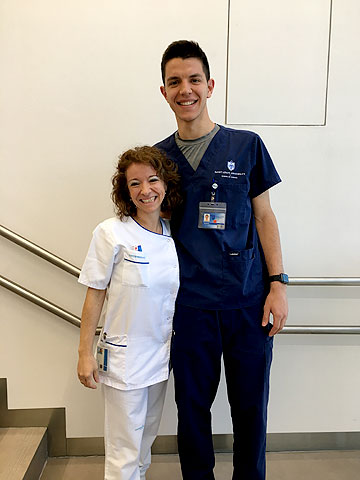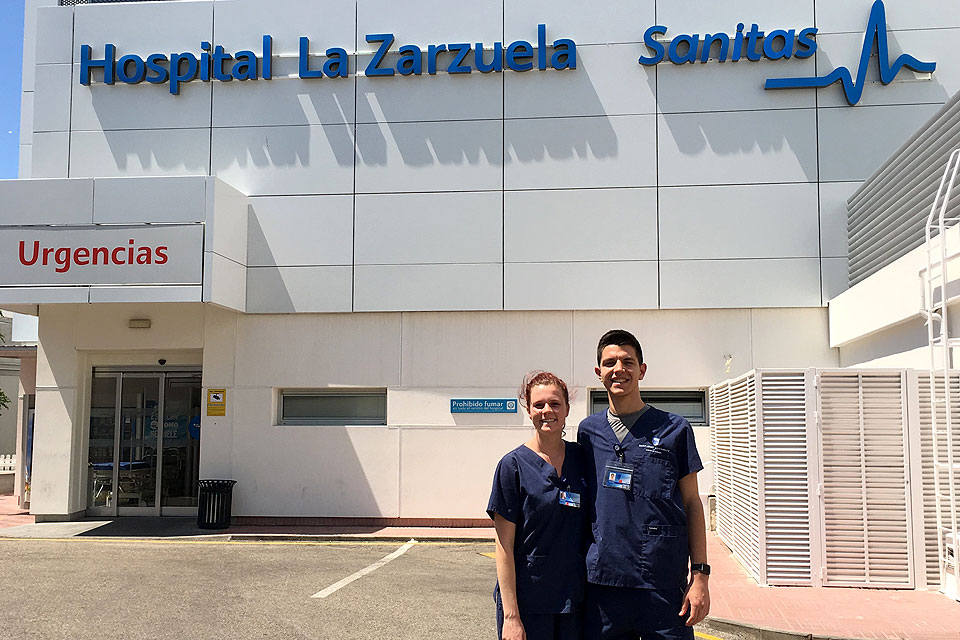Immersed in a Global Culture of Care: Students Learn Nursing Abroad Through SLU-Madrid Summer Program
Saint Louis University nursing students not only learn how to place an IV, but through an immersion program offered at SLU-Madrid, they do so in Spanish hospitals, learning about health care internationally. They also immerse themselves in different cultures of health and wellness through the eyes of their Spanish patients and mentors.
Launched in 2017, SLU-Madrid’s Summer Immersion Program in Nursing gives students the chance to experience health care through a Spanish lens. The students spend four to five weeks training in a Spanish hospital and hands-on training with common nursing tasks such as preparing IV medications.
For rising senior Sidney Smith, a nursing major, the program gave her renewed confidence and excited her about her future nursing career.
“Before coming to Madrid, I was nervous,” Smith said. “But this summer, I’ve put my skills into practice, in a critical care setting in a foreign country where they speak a language that I am not fluent in. The nurses I work alongside trust me. I’ve seen that I can do this!”
The competitive program counts as a nursing elective course toward a student’s degree completion, meaning students who participate get a unique study-abroad clinical experience without delaying their paths to graduation.
“The students immerse themselves in an international innovative experience and gain an insight perspective of nursing in Spain to prepare them to live and work in today's global environment,” Diana Llamas, faculty and clinical nursing coordinator for SLU-Madrid, said.
And for fellow rising nursing senior Luke McClanahan, the emphasis on relationships and family he saw permeate the Spanish health care system expanded his understanding of the role of caregiving in practice.
“From the newest employees to the most experienced, all are a family at this hospital, and all include the best interest of spreading good works and genuine care to all who enter the building into their work,” McClanahan said.
Learning Nursing Skills in an International Setting
Students working in the program can choose a specialty area based on patient age including pediatric, adult and geriatric rotations. They also work in a variety of care settings.
“The students develop further critical thinking skills by working in a different health care system,” Llamas said. “This cultural exchange at a Spanish hospital gives them a broader international appreciation for nursing and a better understanding of health care trends.”
Smith started more than 30 IVs during three weeks working in an urgent care rotation. Her preceptor walked her through tasks, demonstrating and diagramming how to start IV lines to optimize the care individual patients received.
“If I didn’t get a good flow, he would show me how to adjust without having to stick the patient again,” Smith recalled. “This is an incredible technical skill that I am thrilled to be developing.”
Seeking a Global Perspective on Nursing
SLU 101, the University’s orientation program for new Billikens, inspired McClanahan to apply to the immersion program. Intrigued by his SLU 101 leader’s own experience, McClanahan, too, discovered new ways of approaching his nursing work while in Spain.

Work in the Spanish hospital, he said, made him reconsider the role of presence and connection in caregiving.
“It has really hit me and made me realize how much importance the American culture puts on work and rarely ever stops whereas what I have seen here is a very tight familial setting with a constant presence in the room of the loved ones,” McClanahan said. He recalled entering a patient’s room with his nurse-preceptor, Mónica Hernandez, and being welcomed onto the care team by the patient and his loved ones.
“Although I wasn’t directly involved in his immediate care, arriving to his room and being with Mónica, they accepted me with open arms and gave me the entire story about how nurse Mónica has changed their lives and how they are thankful for people in the nursing profession impacting lives like this every day,” McClanahan said. “Upon entering the room, we were both embraced by the warmth and appreciation for the nursing profession and for all involved to provide the best care possible for this gentleman.”
Rising to New Challenges with a Mentor’s Help
Students who participate in the program like McClanahan and Smith become immersed in the Spanish language by necessity as they work with Spanish nurses, physicians and other health care workers, and when they care for patients.
Practicing nursing in Spanish is a key challenge in the program, Llamas explained, but one that inspires students to solve problems creatively and to step outside of their comfort zones.
“They fear not to be able to understand what their nursing preceptors are explaining to them or at times not to be able to address patients' requests because they didn't understand them,” Llamas explained. “Learning is a process, and having patience is key to not get overwhelmed.”
To help students overcome their worries, mentoring is offered as a critical part of the immersion program. Llamas meets with the program’s students weekly, advising them on nursing procedures, protocols, cultural differences and any other concerns they share. She also urges them to trust their Spanish nurse-mentors and preceptors and to ask them for guidance and support.
“I’ve developed both my language and technical nursing skills this summer,” Smith explained. “I’ve also really seen the importance of non-verbal communication. I know what’s going on despite the language barrier.”
Smith and McClanahan have also honed their sensitivities to the role of culture and interpersonal relationships in nursing abroad.
“I’ve actually experienced what it’s like to not be part of the majority culture,” Smith said. “This gives me a whole new understanding of cultural differences, which will undoubtedly impact how I care for future patients. I understand the stress and fear of not being in a familiar culture, and fully recognize the importance of being respectful of and educated on cultural differences.”
Immersed in a Mission of Care
Caring for people is at the heart of what students take away from SLU-Madrid's summer nursing immersion program experience. For Smith and McClanahan, they’ve learned to step outside their linguistic and cultural comfort zones to form bonds with their patients and Spanish colleagues.
“I think that I was able to not only use the Jesuit education but also the care for the entire person to help me become a more thoughtful and more confident nurse,” McClanahan said.
Their experiences and their global relationships, they said, speak directly to their Jesuit education and to their future missions as nurses.
“I have seen how diet, lifestyle, language, and family relationships can impact health. I am better able to understand what I need to know about a patient to help care for them better, beside what might be noted on an intake form,” Smith, who hopes to work with Spanish-language patients in a public care setting like Casa de Salud, a local St. Louis non-profit, or in travel nursing, continued.
“I can see the mission: ‘for and with others,’” Smith continued. “My experience in Madrid has taught me to be with others, even when I am not able to talk. I see the importance of listening. You can be with someone and walk alongside them if you listen, not force your ideas.”
Founded in 1818, Saint Louis University is one of the nation’s oldest and most prestigious Catholic institutions. Rooted in Jesuit values and its pioneering history as the first university west of the Mississippi River, SLU offers nearly 13,000 students a rigorous, transformative education of the whole person. At the core of the University’s diverse community of scholars is SLU’s service-focused mission, which challenges and prepares students to make the world a better, more just place.
Story by Amelia Flood, University Marketing and Communications


















